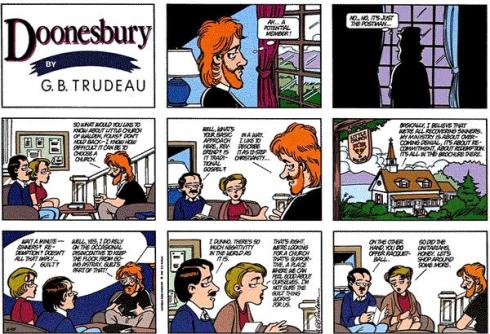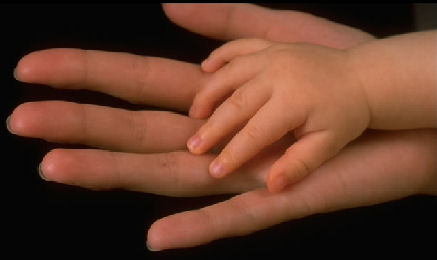You are currently browsing the tag archive for the ‘guilt’ tag.
First Published April 25, 2008.
Becoming the parent of a child with a genetic disease is a harrowing experience. This is likely more true today than it has ever been. We are hardwired to want the best for our children. Discovering they have a life altering condition pulls the rug right out from under parents. Discovering that the very genetic blueprint they passed on to the child is the problem makes this “act of God” personal. Suddenly, it is your fault.
Child birth is an exciting time full of anticipation. What parents often don’t anticipate is the possibility that anything could ever go seriously wrong. I took a first year medical school genetics elective right at the time my wife was expecting our first child. Note to all medical students. DO NOT EVER do this. It is a bad idea. It brought me right down to Earth real quick. It also caused me lost sleep, racing thoughts, and all around needless worry.
I also witnessed firsthand some real parental anguish. My heart ached for them. They became very caught up in questions like what the diagnosis actually was, what the chances of having another child with the same problem were, and do they need to have family members tested. The more understanding we have, the more directed the questions and more uncertain the future.
This has created or at least accentuated a new phenomenon, gene guilt. In college I had a cell biology professor who referred to himself as a “genetic cess pool.” on account of a daughter with spinal muscular atrophy, type I, a fatal recessive genetic disorder. The irony is that his genes were likely no worse than anyone else’s. It just happened that he married someone with a matching bad gene. We likely all walk around with at least a few faulty genes, usually more, among our thousands. Any one of these could result in disease if we concieve children with someone with the same exact hit. The odds of that are low, like winning the lottery, only the prize is heartbreaking.
Some genes are bad enough that disease shows up with just one copy, but for unknown reasons is super mild in some people, who may go undiagnosed until half their children get it. Other gene mutations, called nucleotide repeats actually worsen through generations until the unlucky one gets disease, and then their children get worse disease. With X chromosome disorders, the Mother passes a gene to her sons that caused her no problem because she had both a good and a bad copy. Problem is her son gets the bad gene, and has no second copy because he is male. Other diseases of the mitochondria are given strictly from the mother. All of these situations can worsen the guilt and crush the self esteem of the parent.
Science compounds the problem with evolution. We learn that nature’s way is survival of the fittest. Bad genes are selected out of populations naturally. With medicine, we have sort of beat evolution over the head by outsmarting nature, at least temporarily. People with chronic conditions are living longer and better than ever before. It is a natural step therefore, once we know about a bad gene and see its effect, to wonder if we should not select it out of the population by not having any more children. This is unnatural selection, if you will. We reason that we must do something nature has been doing anyway without our input. Some reason that if they have children they are threatening the gene pool of the race. I think it is a very flawed mindset.
Certainly many disagree with me. During the above mentioned genetic rotation, I met a teenager who was diagnosed with Li-Fraumeni syndrome, a disorder that increases susceptibility to cancer. Her parents died at a young age, and she was being raised by an aunt. The conversation between them was profound. This patient felt emphatically that her life was not a mistake. To suggest this was perhaps even offensive to her. Who would want to think their life was a mistake? For this reason, she insisted that she intended to have kids if the opportunity arose. The Aunt was mortified.
Granted, this patient had not yet experience the ravages of cancer, perhaps her point of view was flawed, but I think she had a point. This is a tough issue and certainly there are no easy answers. But I believe we often overestimate the suffering of others. I can’t help but admire her for realizing she is more than her genes. Her life was more than her disease. Individuals have much more contribution to make to society than just their genome.
I think this is a point too many people miss, especially us doctors. We are consumed with patient’s conditions. The disease too easily become the only reason we relate to them at all. We start to refer to patient’s who happen to have Cystic Fibrosis as CF’ers, Sickle cell disease as sicklers, with Asthma as wheezers, etc. al etc. It obscures the fact that we a dealing with living, thinking, feeling human beings. We physicians wan’t to prevent disease, not enable it. We grow weary of those who do not take care of themselves and present us with disease. Too many doctors fall into the snare of exasperation and contempt for the reproductive habits of those we care for.
We are too obsessed with perfection in this country. We airbrush pictures of models, causing young women to starve themselves to meet a nonexistent ideal. We celebrate beauty, strength, speed, endurance. We reject difference. It is a natural social response with ugly consequences. Just as the sick, albino or deformed chick will be relentlessly assaulted by the rest of the brood, we can have a visceral revulsion witnessing malformation, scarring, or amputation. For me, this is the human flaw we really need to work on, not the diseases. As we gain the power to manipulate our genome, how will we decide what is appropriate to treat and what is not. Short height is now an indication for human growth hormone therapy. I find that disturbing.
We need to learn to see the beauty in our flaws. Only then will we really see the beauty in humanity. I believe our imperfections are a centrally important part of our being here in the first place. Forty years ago, a French philosopher named Jean Vanier founded a religious community devoted entirely to living and worshipping among developmentally impaired adults. Speaking of Faith featured L’arche in a podcast with some profound, moving, and amazing descriptions of what we can learn from them. I encourage everyone to take a listen.
The dystopian movie Gattaca takes a look at just where a culture of perfection can lead. It isn’t pretty. In the 1930s a madman rose to power with a dream of a blonde haired, blue eyed master race setting off the most massive conflict in world history. Will we as a people fall prey to the same ideas as we develop the power to actually make it happen?
First published Jan. 13th 2008.
Disclosure–This is an intensely personal subject for me. I suffer from Major Depression, I have had to come to a knowledge of this thing both as a patient and a physician and as a committed religious person. In my journey, I have gained a LOT of perspective and at a painful price. Ironically, I think the biggest reason I still use the Doc pseudonym for posting is the stigma this problem might create for me as a physician. My particular story is to come in a later post when I am in a more soul baring mood.
Who is to blame for depression? Ourselves, God, the devil, our genes, our culture, our loved ones, our experience, our brain? The question is perplexing and has loud advocates in all camps. Everyone wants to fit it into their boxes and have their own solutions. In my experience each is incomplete. A condition arising at the seat of consciousness, with devastating consequences for our families, our relationships, our work, our personal happiness and yet leaving no marks is difficult for us as humans to reconcile. However reconcile it we must, because Depression carries with it a mortality in the form of suicide. Read the rest of this entry »

Di at Doctor and Covenants pointed me to this story, where a brain surgeon was operating to remove a mass from a patient and and ended up finding a foot. The story states that this is either a rare type of tumor called a teratoma or is it a rare case of a twin that remained attached to the patients and was totally enveloped into the skull, a condition called fetus in fetu.
The image is striking, and gives a certain visceral reaction, which is largely why pictures like this make their rounds on the internet. Read the rest of this entry »
I am not typically a holiday person. My socially phobic nature would have me out of costume at Halloween, staying in New Year’s Eve, and away from the crowds on the Fourth of July if it weren’t for a wife who drags me out.
Somehow, this all changes at Christmas. Instead of dragged down, I’m somehow energized by it. I love everything about it. My winter doldrums and seasonal affective disorder always lifts for a few weeks, until it comes crashing back down each January.
” We have learned by sad experience that it is the nature and disposition of almost all men, as soon as they get a little authority, as they suppose, they will immediately begin to exercise unrighteous dominion.”
Few things in life distort the relationship of communities and society more than power and politics. The American revolution and the revolution in France introduced democracy to both America and Europe in roughly the same time period. The French revolution ended up much more violent and tumultuous than the former, described by Charles Dickens as “the best of times” and “the worst of times” simultaneously. The French revolution was an extremely violent and intolerant uprising. It led to mass beheading and guillotining of the aristocracy. It led to the rise of the first of the modern despots in Napoleon, who enthralled the recently empowered majority, was voted into power which he refused to release and unleashed upon the rest of Europe, as the revolution ran off its rails.
(A note- Please don’t worry, I am not psychotic, not really hearing voices. I am just referring to the automatic thoughts and inward conversation we all have, even when we are unaware that we are doing it.)
I am starting to feel it now. I am tired.
I am tired of politics. I am tired of people talking at other people. I am tired of trying to reach the unreachable. I am tired of doing things I usually enjoy. This is the world of depression and I fear it is creeping back. I am tired of blog shouting matches. I am tired of others condemning others who condemn them back. I am tired of man’s inhumanity to man. I am tired of writing. I even sucked the joy out of the Olympics in my last post. I am tired of fear and its ugly effect on people. I am tired of writing. I am tired of trying to wrestle out the beautiful, praiseworthy, and good report out of what I find, what I read, and what I write.
The voice is getting loud. The voice is a pessimist. It finds fault with anything I do. I can’t write anything because it will not be good enough. There is nothing worth writing. There is just weariness. A while back John D. at storied mind wrote about how creativity has at times burst him out of depression. All I feel right now is depression stamping out creativity.
Medicine for the brain is incredibly complex. Yet, the joke goes around medical circles that Neurologists are admirers of disease, not treater’s of it. This is far less true now than forty years ago, and is rapidly becoming less and less true everyday, but that small kernel of truth does say something about we who are drawn to the field. I really do find the disease processes that affect brain function seriously fascinating.
We learn almost everything we know about the brain from what happens when things go wrong. Genetic diseases become our laboratory, nature the experimenter, allowing us to learn things we would be monsters for trying to recreate in the lab with people. In fact, Nazi physicians are generally hailed as monsters for doing precisely this, reducing the person to lab rat.













Recent Comments